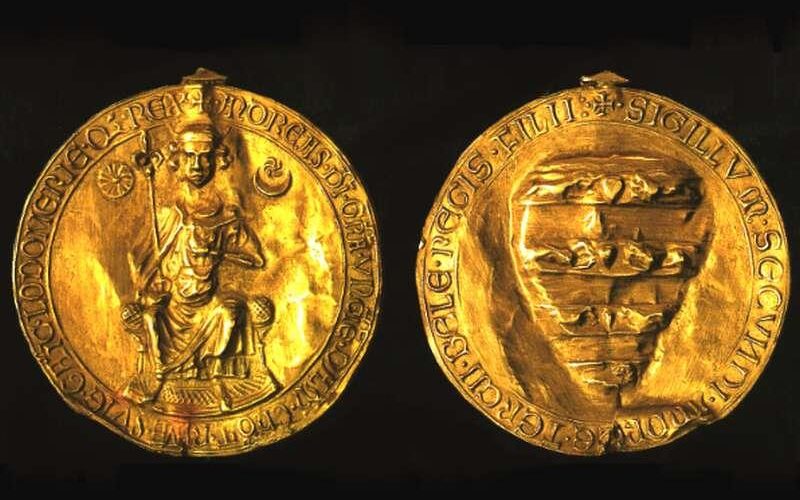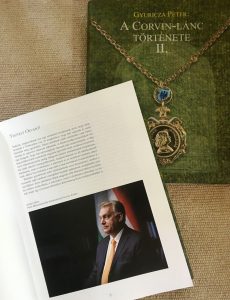
The Friends of Hungary Foundation organized a conference entitled "Decretum of our Hungarianness - our civilizational heritage".Continue reading
“Pro scientia, litteris et artibus” – “for science, literature and the arts” – was the motto of the award, quoted by Prof. Dr. E. Sylvester Vizi, President of the Hungarian Corvin Chain Board and former President of the Hungarian Academy of Sciences, at the publication of the volume on the history of the Corvin Chain.
The book launch ceremony took place on May 5, 2023 at the Board’s headquarters at the Villa Róheim, Budapest.
The Corvin Chain is awarded to distinguished individuals who have made an outstanding contribution to the improvement of science, universal culture, and Hungarian public thought, and who have made outstanding contributions to the advancement of Hungarian culture. Unlike other state awards (such as the Kossuth Prize, the Hungarian Order of Merit), the recipients of the Hungarian Corvin Chain and the Hungarian Corvin Wreath form a Corps. The conditions for the award of the medal, the rights and obligations attached to it, and the functions of the Corvinus Corps are regulated by law. The Board is chaired by academician E. Sylvester Vizi and its vice-chair is Éva Marton, world-famous opera singer and academic, themselves holders of the highest honors. They were awarded the Corvin Chain in 2012, and the Order of St. Stephen a few years later by János Áder, then President of the Republic, in the presence of Prime Minister Viktor Orbán and Speaker of the House László Kövér.

Prof. Dr. E. Sylvester Vizi, President of the Hungarian Corvin Chain Board and former President of the Hungarian Academy of Sciences with Éva Marton, world-famous opera singer and academic. Photo: Hungary Today
At the request of the Hungarian Corvin Chain Board, Péter Gyuricza, journalist, associate professor, founder of TV2 and author of 25 books, undertook the task of researching and writing the history of the Corvin Chain. As we learned at the launch of this beautifully designed, lavishly illustrated and comprehensive work, in 1930 Governor Miklós Horthy founded the Hungarian Corvin Chain, together with the Hungarian Corvin Wreath and Hungarian Corvin Insignia awards, on the idea of Count Kunó Klebelsberg, Minister of Religion and Public Education.
They are fittingly named after King Matthias Corvinus I (1443-1490), whose reign elevated Hungary to the status of one of the most influential states in European political and intellectual life. The medal is a replica of a 15th century medal with the image of the monarch. Among the first recipients were the composer Ernő Dohnányi (1877-1960) and Kunó Klebelsberg himself (1875-1932), who was credited with the creation of 5,000 folk school classrooms and Hungarian colleges abroad.
After 1944, the Corvin chain was not awarded for a long time. Although it was not abolished by law, it was, as Péter Gyuricza put it, followed by decades of “deepening” of the award. The new post-war era brought new forms of honors, many of which were dependent on politics and the regime. Gábor Ujvári, a historian and archivist, provided the historical context for the audience.
In 2001, thanks to Prime Minister Viktor Orbán, the Hungarian Corvin Chain of Honor was re-established. As the Prime Minister of Hungary said in the foreword to the book,
…only those honors that are the result of our national character and culture will survive through generations and epochs. But however deep the roots of a medal may go, its true prestige is always in the people who have received it.”
To be a member of the Corvin chain is a shared service, aimed at preserving, strengthening, and transmitting the intellectual achievements that transcend party interests and political boundaries and which are the guarantee of the freedom and independence of the Hungarian nation.
Among those honored after 2001 are economist Sándor Lámfalussy (1929-2015), physicist Ede Teller (1908-2003), writer Magda Szabó (1917-2007), cameraman Vilmos Zsigmond (1930-2016). Former Foreign Minister János Martonyi was awarded the prize in 2018. The maximum number of recipients of the Corvin chain at any one time is 15, currently there are 12 of them.

Photo: Hungary Today
The Head of the Hungarian Corvin Chain Office of the Prime Minister’s Office and the Chief Secretary of the Corvin Chain Board is István Klinghammer, Professor and State Secretary for Higher Education in the second Orbán government. Speaking at the book launch, he said that the light that illuminates the future always comes from the past. This book is also an opportunity to see more of the past, of the holders of the Corvin chain, whose tasks link them to the generations before and after them.
The headquarters of the Corvin Chain Corvin, a public body, is located in the Hermina field near Budapest’s City Park. The Villa Róheim was built in 1900 based on a design by Manó Pollák, commissioned by the wealthy timber merchant Sámuel Róheim. The historic building, which ranges from French Renaissance to Art Nouveau and has Moorish features, is not known for its beauty, but also for a tragic murder. On October 31, 1918, the tenant of the house, former Prime Minister István Tisza, was assassinated here.
The fate of the villa was sealed by the ravages of war and the decades of socialism. It was a real rescue when in 2015, with the support of Prime Minister Viktor Orbán and on behalf of the Hungarian Corvin Chain Board, Ybl Miklós Miklós Prize-winning architect István Mányi deciphered the former message of the ruined building and began a major reconstruction project. The volumes on the history of the Corvin chain were actually completed last year, but the launch was timed to coincide with the inauguration of the building.
“Hungary has always been famous for having considerable intellectual capital,” said President E. Sylvester Vizi in his closing remarks.
Since our first king, St. Stephen, we have given the world many saints and exemplary persons. Icons like the current recipients of the Corvin chain, who can be compasses for society, who can reconcile their individual interests with the spirit of community, bonum commune.”
“It is our right and our duty to speak out on issues that affect the present and the future of our country, to advise or criticize those involved in public life. We are proud of what our ancestors have given to the world, and we are interested in building on this past to maintain a healthy national consciousness.”
Featured image: Hungary Today